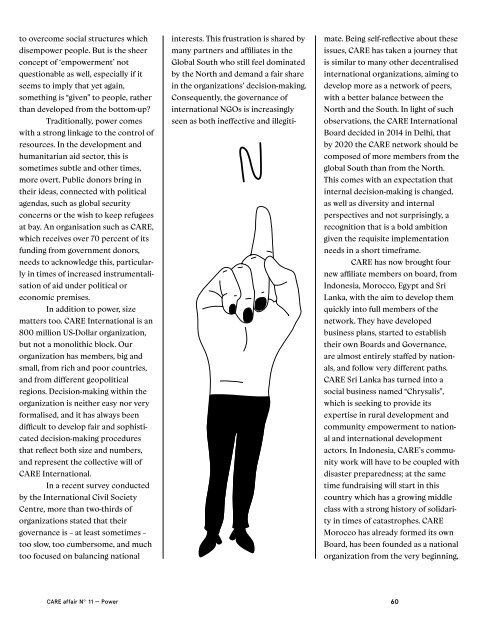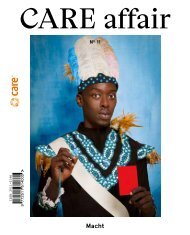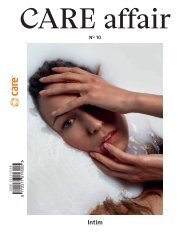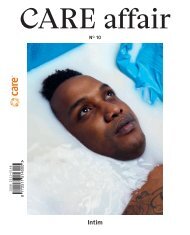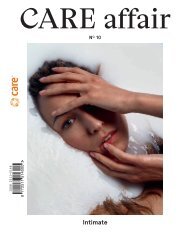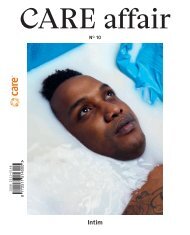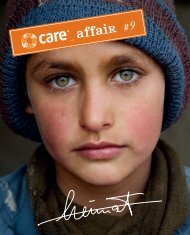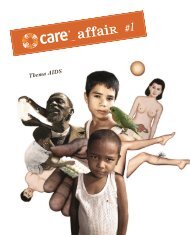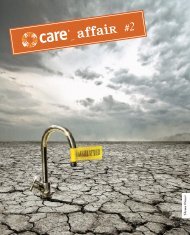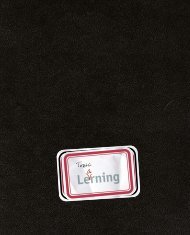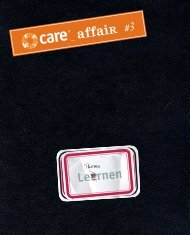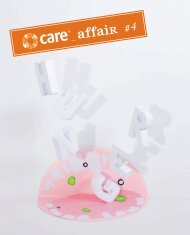CARE Affair #11 - Power
You also want an ePaper? Increase the reach of your titles
YUMPU automatically turns print PDFs into web optimized ePapers that Google loves.
interests. This frustration is shared by<br />
many partners and affiliates in the<br />
Global South who still feel dominated<br />
by the North and demand a fair share<br />
in the organizations’ decision-making.<br />
Consequently, the governance of<br />
international NGOs is increasingly<br />
seen as both ineffective and illegitito<br />
overcome social structures which<br />
disempower people. But is the sheer<br />
concept of ‘empowerment’ not<br />
questionable as well, especially if it<br />
seems to imply that yet again,<br />
something is “given” to people, rather<br />
than developed from the bottom-up?<br />
Traditionally, power comes<br />
with a strong linkage to the control of<br />
resources. In the development and<br />
humanitarian aid sector, this is<br />
sometimes subtle and other times,<br />
more overt. Public donors bring in<br />
their ideas, connected with political<br />
agendas, such as global security<br />
concerns or the wish to keep refugees<br />
at bay. An organisation such as <strong>CARE</strong>,<br />
which receives over 70 percent of its<br />
funding from government donors,<br />
needs to acknowledge this, particularly<br />
in times of increased instrumentalisation<br />
of aid under political or<br />
economic premises.<br />
In addition to power, size<br />
matters too. <strong>CARE</strong> International is an<br />
800 million US-Dollar organization,<br />
but not a monolithic block. Our<br />
organization has members, big and<br />
small, from rich and poor countries,<br />
and from different geopolitical<br />
regions. Decision-making within the<br />
organization is neither easy nor very<br />
formalised, and it has always been<br />
difficult to develop fair and sophisticated<br />
decision-making procedures<br />
that reflect both size and numbers,<br />
and represent the collective will of<br />
<strong>CARE</strong> International.<br />
In a recent survey conducted<br />
by the International Civil Society<br />
Centre, more than two-thirds of<br />
organizations stated that their<br />
governance is – at least sometimes –<br />
too slow, too cumbersome, and much<br />
too focused on balancing national<br />
mate. Being self-reflective about these<br />
issues, <strong>CARE</strong> has taken a journey that<br />
is similar to many other decentralised<br />
international organizations, aiming to<br />
develop more as a network of peers,<br />
with a better balance between the<br />
North and the South. In light of such<br />
observations, the <strong>CARE</strong> International<br />
Board decided in 2014 in Delhi, that<br />
by 2020 the <strong>CARE</strong> network should be<br />
composed of more members from the<br />
global South than from the North.<br />
This comes with an expectation that<br />
internal decision-making is changed,<br />
as well as diversity and internal<br />
perspectives and not surprisingly, a<br />
recognition that is a bold ambition<br />
given the requisite implementation<br />
needs in a short timeframe.<br />
<strong>CARE</strong> has now brought four<br />
new affiliate members on board, from<br />
Indonesia, Morocco, Egypt and Sri<br />
Lanka, with the aim to develop them<br />
quickly into full members of the<br />
network. They have developed<br />
business plans, started to establish<br />
their own Boards and Governance,<br />
are almost entirely staffed by nationals,<br />
and follow very different paths.<br />
<strong>CARE</strong> Sri Lanka has turned into a<br />
social business named “Chrysalis”,<br />
which is seeking to provide its<br />
expertise in rural development and<br />
community empowerment to national<br />
and international development<br />
actors. In Indonesia, <strong>CARE</strong>’s community<br />
work will have to be coupled with<br />
disaster preparedness; at the same<br />
time fundraising will start in this<br />
country which has a growing middle<br />
class with a strong history of solidarity<br />
in times of catastrophes. <strong>CARE</strong><br />
Morocco has already formed its own<br />
Board, has been founded as a national<br />
organization from the very beginning,<br />
<strong>CARE</strong> affair N o. 11 — <strong>Power</strong><br />
60


